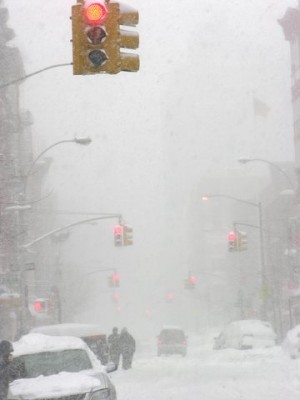
Radley Horton on CNN New Day: “What is to Blame for Extreme Weather?”
On February 5th, Dr. Radley Horton, a climate scientist at Columbia University, discussed the current extreme weather throughout the United States and climate change on CNN’s “New Day”. In the interview, Dr. Horton struck a measured, yet compelling, tone discussing a possible mechanism climate change may have on the current extreme weather currently occurring:
“The basic argument goes like this — we know that as greenhouse gas concentrations have gone up, the amount of sea ice in the Arctic has dropped by 75 percent in three decades. Temperatures have gone up a lot in that region as a result. The jet stream which keeps the cold air in the north and warm air in the south seems to be getting wavier, getting more of these meanders, more of these blocks. It’s like opening the door of a freezer or a refrigerator, the cold air spills out from the north further south than it might have in the past. But, of course, what’s also happening is the warm air is replacing it.”
He notes that despite the recent extended period of cold weather, average temperatures for the U.S. and globe continue to be near record highs:
We have this long-term trend globally, and in specific cities towards much more frequent extreme heat waves and extreme cold waves. Between 2000 and 2009, twice as many record-breaking heat events in the U.S. as cold events, as greenhouse gas concentrations have gone up.
…
That’s the big picture. More extreme warming, higher sea levels, and more flooding. But what people want to know about right now, are we also seeing more of these cold air outbreaks and snowstorms? And the answer is possibly. The research is still out on that piece”
…
At the same period of time, where are seeing all-time records being broken not just for a particular day but all-time records over the entire record-keeping period in Alaska. Temperatures of 62 degrees in parts of California, Sacramento, beating their monthly record by 5 degrees. That hasn’t happened in the East during this cold event.
Asked by the host if he believed we would see more extremes, Horton answered: “Yes, that’s exactly right. So, there is research that I’ve been involved in and others looking at the possibility that the loss of sea ice in the Arctic so far away may actually influence our weather here. It’s still speculative research.”
He emphasized at the end of the interview that this causal mechanism, while logical and persuasive, must still undergo more testing:
“We can’t say for sure the change in sea ice is responsible for this wave because this is emerging research. But I think it’s a more and more compelling case. There’s always going to be variability, it’s always going to be these waves in the jet stream, but it does seem, according to some research, that as we lose that sea ice in the Arctic, one possible could be more cold air spilling south, more warm air going north. We’ve got to keep our eye on that.”
If you would like see the transcript of the program, click here.






[…] Radley Horton on CNN New Day: “What is to Blame for Extreme Weather?” […]